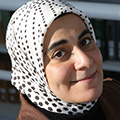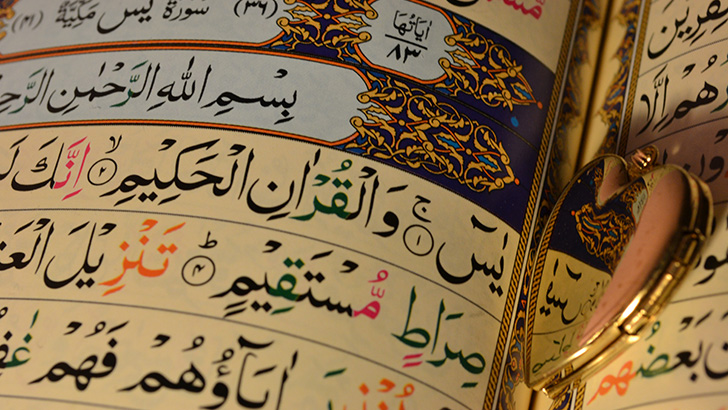Fulfilling the Need for Muslim Chaplains
Teaching Islamic studies and directing the Islamic Chaplaincy Program at Hartford Seminary is truly a great privilege. Being the only formally accredited Islamic chaplaincy certificate program in the country, we have promising students from all over the United States who come to Hartford to learn how to think critically, live faithfully, and serve their diverse communities as spiritual care givers. Our program consists of a two-year master’s degree in religious studies with a focus on Islamic studies and Christian-Muslim relations followed by a one-year certificate program in Islamic chaplaincy in which students learn skills related to counseling, leadership, and public speaking.
The Islamic Chaplaincy Program was formed in 2001 in response to the growing need for Muslim representation in the military and the lack of any accredited institution that formally trains Muslims to fill this niche. Over time, Muslims have been sought in hospitals, universities, and prisons to serve in similar capacities as religious advisors and spiritual care givers. This made Hartford Seminary's Islamic Chaplaincy Program one of a kind in the nation and a hub from which many highly qualified chaplains today received their training. Being a part of the Macdonald Center for the Study of Islam and Christian-Muslim Relations shapes in great part the approach we have to teaching in this field.
The first component of the Islamic Chaplaincy Program is the master’s degree in Islamic studies and Christian-Muslim relations. This is a 48-credit program typically completed in two years and includes courses in the disciplines of Islamic religious thought and practice, historical and contemporary perspectives on Islamic societies, and theological and social interactions between Christianity and Islam. This is then followed by a one-year 24-credit Islamic chaplaincy certificate in which students focus on enhancing pastoral skills essential to their work as chaplains. In this component of the program, students will take courses related to pastoral care, practices of ministry, as well as complete 240 hours of a supervised field education and one unit of clinical pastoral education.
Hartford Seminary has a strong history of seriously engaging faith while balancing this with critical thought and high academic standards. As a seminary, faith is valued and regarded as a relevant part of a student’s learning experience. The Christian, Muslim, and Jewish professors at Hartford Seminary are believers in the faith that they teach. At the same time, they have academic training and value the importance of looking at religious practice through a critical lens. This forms a unique learning experience in the classroom in which professors and students can both appreciate the contributions of faith traditions to societies and individuals while also thinking about the way practices and interpretations have been formed within the frameworks of human history. The diversity of the student population in the interfaith environment on campus also translates into classrooms, where students are most often a mixture of Christians and Muslims from a variety of perspectives within each tradition. This creates a rich learning experience for students who engage with each other in classroom discussions and also ask questions from points of view that are often quite distinct from the way another student—born and raised in her or his own religious tradition—would think about faith-related matters.
This unique combination of faith, critical thinking, academic standards, and religious diversity at Hartford Seminary creates a distinctive environment for students to both expand their minds and souls. This experience is also what makes our Islamic chaplaincy program unique. Muslim students have the opportunity to learn about their faith in a setting that is supportive of the role of faith in their lives while simultaneously being exposed to a wide range of perspectives both within their own faith tradition as well as with those from outside of their tradition. This is an essential component of what we do in the Islamic Chaplaincy Program at Hartford. Through the Hartford Seminary approach of "deepening faith, and exploring differences" as highlighted in the seminary’s motto, our students are equipped to work in the public sphere as Muslim chaplains where both spiritual fortitude and the capacity to work within a framework of diverse social, religious, and cultural world views is essential to the role they will play as spiritual care givers.
 Feryal Salem is assistant professor of Islamic scriptures and law, codirector of the Islamic Chaplaincy Program, and associate editor of The Muslim World journal at Hartford Seminary. Her research interests are in Islamic theology, hadith, Sufism, Islamic scriptures, as well as interfaith dialogue. Feryal received her PhD in Islamic studies from the University of Chicago and her forthcoming book, The Emergence of Early Sufi Piety and Sunni Scholasticism: 'Abd Allāh b. al-Mubārak and the Formation of Sunnī Identity in the Second Islamic Century, will be published in Brill's Islamic History and Civilization Series in the late spring.
Feryal Salem is assistant professor of Islamic scriptures and law, codirector of the Islamic Chaplaincy Program, and associate editor of The Muslim World journal at Hartford Seminary. Her research interests are in Islamic theology, hadith, Sufism, Islamic scriptures, as well as interfaith dialogue. Feryal received her PhD in Islamic studies from the University of Chicago and her forthcoming book, The Emergence of Early Sufi Piety and Sunni Scholasticism: 'Abd Allāh b. al-Mubārak and the Formation of Sunnī Identity in the Second Islamic Century, will be published in Brill's Islamic History and Civilization Series in the late spring.
Photo credit: orangefan_2011 via Foter.com / CC BY-ND

